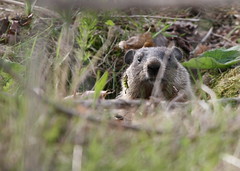 On a warm Groundhog Day & with mild temperatures forecast to continue across Virginia through the 10-day outlook, E&E News (sub. req.) takes a closer look at at how global warming is impacting Punxsutawney Phil & friends:
On a warm Groundhog Day & with mild temperatures forecast to continue across Virginia through the 10-day outlook, E&E News (sub. req.) takes a closer look at at how global warming is impacting Punxsutawney Phil & friends:
Groundhogs are one of the few animals that achieve true, or “profound,” hibernation, burrowing down below the frost line for the coldest months of the year. During this period, which usually lasts from mid-October to late February, a groundhog’s heart rate drops from 80 beats a minute to only three or four, and its body temperature falls by 60 degrees. Warmer temperatures shorten hibernation, causing groundhogs to burrow later and rise earlier than is customary, said [Cornell wildlife expert Paul] Curtis.
That can be a problem if groundhogs rise before their spring food supply has emerged. But the milder winters & earlier springs have a more serious wildlife implication for Virginians:
“The big one is deer,” he said. “Mother deer emerge from mild winters with a lot more of their body fat still on them, meaning that they’re less likely to drop stillborn calves. That can certainly make for a population swell, particularly when you have a number of warm years back-to-back.”
Although deer can devastate plant life when their populations grow out of control, the real danger to humans comes from the ticks they carry, said Curtis. Deer ticks spread Lyme disease, a debilitating bacterial infection that can result in symptoms from chronic muscle aches to paralysis.
Global warming loads the dice for milder winters. How warm has this winter been? Arlington’s National Airport is having its 4th-warmest winter on record so far. Of the 21 warmest January months in DC area history, 4 have come since 1998. That fits right into the global trend – 2011 was the 9th-hottest year on record according to NASA. And since 1976, 2011 was the 35th consecutive year that the yearly global temperature was above average.
And it’s important to remember how global warming has completely changed the record books – before the late 1990s, 2011 would’ve been the hottest year on record. Man-made carbon pollution has rewritten our temperature records as thoroughly as steroids rewrote baseball’s home run records.



![Sunday News: “Trump Is Briefed on Options for Striking Iran as Protests Continue”; “Trump and Vance Are Fanning the Flames. Again”; “Shooting death of [Renee Good] matters to all of us”; “Fascism or freedom? The choice is yours”](https://bluevirginia.us/wp-content/uploads/2026/01/montage011126.jpg)
![VA DEQ: “pollution from data centers currently makes up a very small but growing percentage of the [NoVA] region’s most harmful air emissions, including CO, NOx and PM2.5”](https://bluevirginia.us/wp-content/uploads/2026/01/noxdatacenters.jpg)

![Thursday News: “Europe draws red line on Greenland after a year of trying to pacify Trump”; “ICE Agent Kills Woman, DHS Tells Obvious, Insane Lies About It”; “Trump’s DOJ sued Virginia. Our attorney general surrendered”; “Political domino effect hits Alexandria as Sen. Ebbin [to resign] to join Spanberger administration”](https://bluevirginia.us/wp-content/uploads/2026/01/montage010826.jpg)











